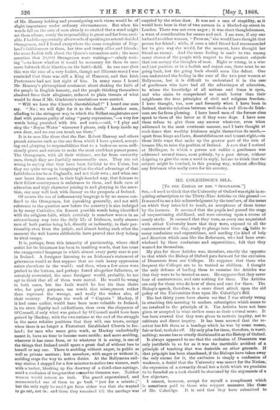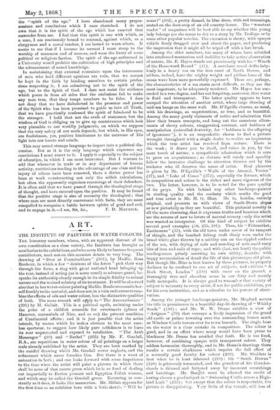MR. COLERIDGE'S BILL.
[To THE EDITOR. OF THE " SPECTATOR."1
Sin,—I used to think that the University of Oxford was right in re- quiring subscription to the Thirty-Nine Articles on this ground :- It seemed to me a fair acknowledgment by the teachers, of the terms on which they intended to teach, an acceptance of those terms by the learners. It assumed that the pupils bad passed the stage of unquestioning childhood, and were entering upon a course of manly study. It assumed that they were, as every one acquainted with either University knew that they were, exposed to all the controversies of the day, ready to plunge into them all, liable to many confusions and superstitions, and needing the kind of help and direction which men like the Reformers, who had been over- whelmed by those confusions and superstitions, felt that they wanted for themselves.
My plea for these Articles was, therefore, exactly the "opposite to that which the Bishop of Oxford puts forward for the exclusion of Dissenters from our Colleges. He supposes that those who frequent the Colleges are to be treated as children. I thought the only defence of leading them to examine the Articles was that they were to be treated as men. He supposes that they never hear of controversies, and care nothing for them. The Articles are only for those who do hear of them and care for them. The Bishop's speech, therefore, is a more direct attack upon the old policy of the Universities than upon Mr. Coleridge's Bill.
The last thirty years have shown me that I was utterly wrong in attaching this meaning to modern subscription which seems to me involved in the principle of it. The Articles have not been given or accepted in what strikes some as their natural sense. It has been avowed that they were given to restrain inquiry, not to cultivate and direct inquiry. It has been avowed that the re- ceiver has felt them as a bondage which he was by some means, fair or foul, to shake off. My only plea for them, therefore, is worth nothing; no one has so utterly disclaimed it as the Bishop of Oxford.
It always appeared to me that the exclusion of Dissenters was only justifiable in so far as it was the inevitable accident of a principle of teaching that was desirable on other grounds. If that pripciple has been abandoned, if the Bishops have taken away the only excuse for it, the exclusion is simply a confession of weakness, a denial that the University was meant for the Nation,' the expression of a cowardly dread lest a faith which we proclaim to be founded on a rock should be shattered by the arguments of a few objectors.
I cannot, however, accept for myself a compliment which is sometimes paid to those who support measures like those of Mr. Coleridge. It is said that they have submitted to own that it is the spirit of the age which has exacted that surrender from me. I feel that this spirit is one with which, as a man, I am continually bound to contend, against which, as a clergyman and a moral teacher, I am bound to warn others. It seems to me that if I became its servant I must stoop to the worship of mammon and of success, and wear the livery of some political or religious faction. The spirit of the age enthroned in a University would prohibit the cultivation of high principles and the advancement of sound knowledge.
In maintaining that external restraints upon the intercourse of men who hold different opinions are vain, that we cannot be kept in the faith by binding ourselves to certain profes- sions respecting it, I am submitting not to the spirit of the age, but to the Spirit of God. I dare not resist the evidence which pours in from all sides that the exclusions fail to make any men true, that they tempt numbers to be false. I dare not deny that we have disbelieved in the presence and power of the Spirit who has been promised to guide us into all Truth, that we have practically confessed the spirit of falsehood to be the stronger. I hold that not the craft of statesmen but the wisdom of God is obliging us to give up contrivances which look very plausible to our worldly judgments, on which we suppose that the very safety of our souls depends, but which, in His eyes, are foolishness, yes, positive hindrances to the entrance of His light into our hearts and minds.
This may sound strange language to import into a political dis- cussion. But as it is the only language which expresses my convictions I must resort to it. I apply it especially to the subject of education, in which I am most interested. But I venture to add that whenever in trade or in any department of human activity, restrictions tending to the advantage of one class and the injury of others have been removed, there a divine power has been at work counteracting not only the selfish calculations, but often the apparently sagacious reasonings of their defenders. It is often said that we have passed through the theological stage of thought, and have entered upon the positive. It may be found that the positive stage is also of necessity the theological ; that where men are most directly conversant with facts, they are most compelled to recognize a battle between spirits of good and evil, and to engage in it.—I am, Sir, &c., F. D. MAuracE.



































 Previous page
Previous page